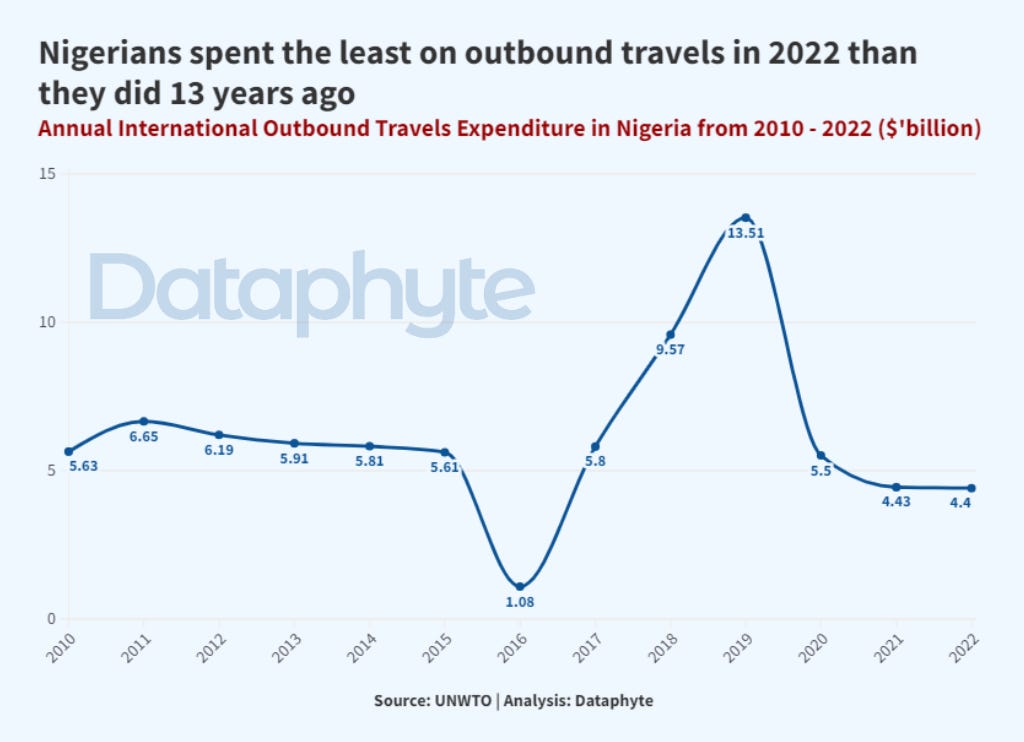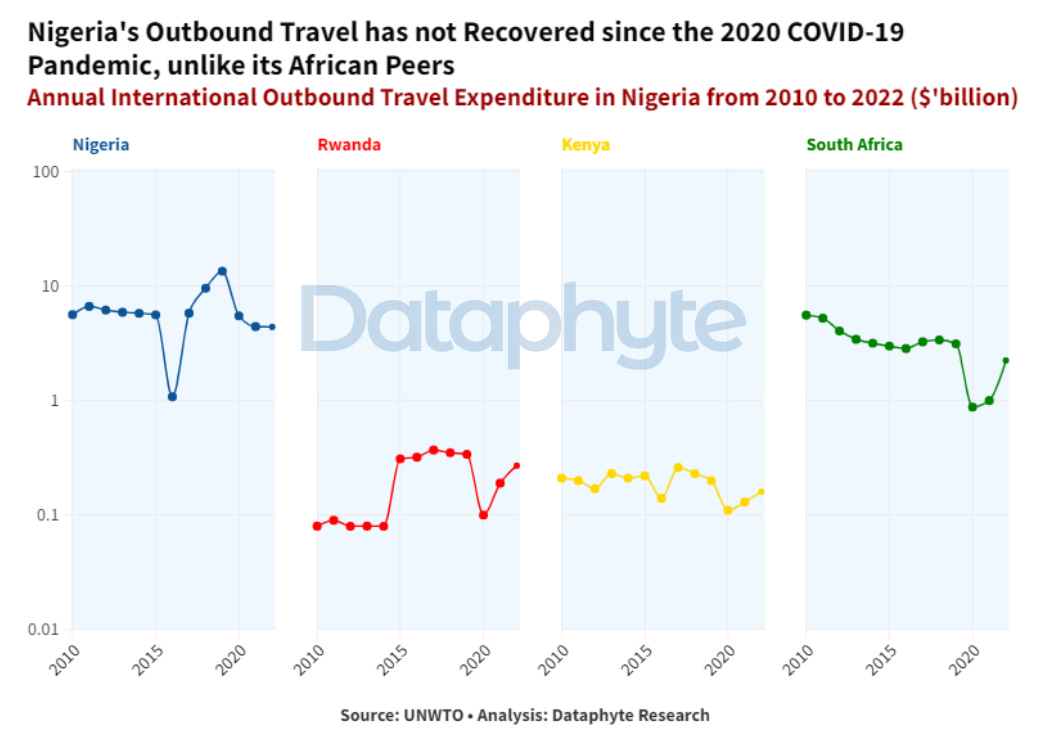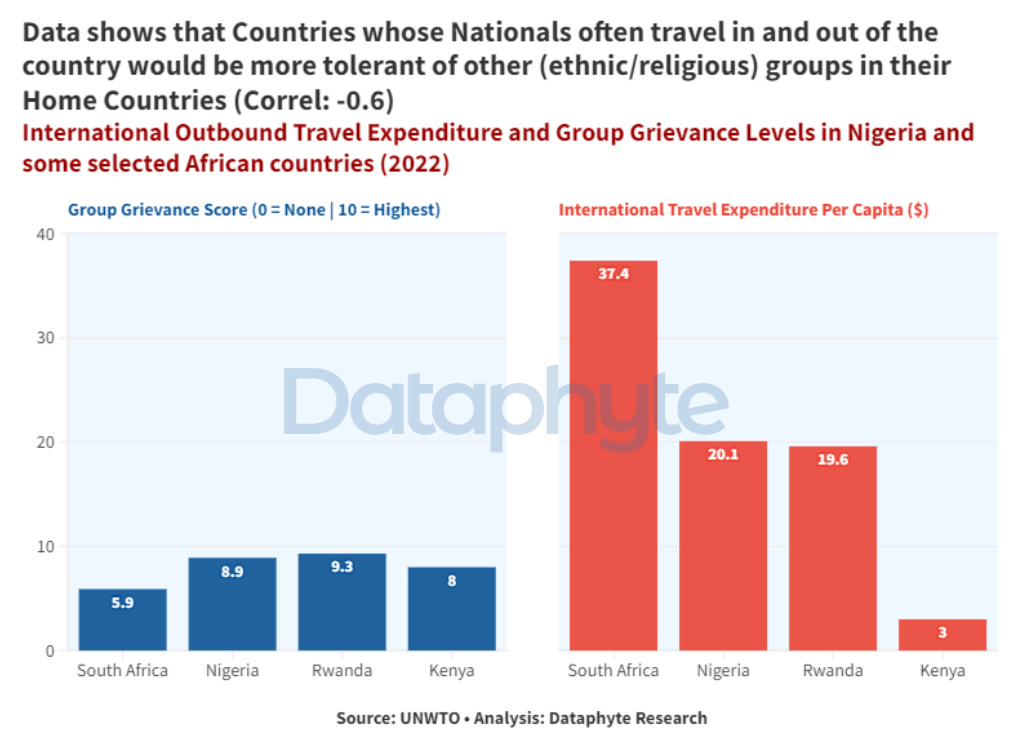Travel Tumbles: Pre-Pandemic
Nigerians’ expenditures on outbound travel have drastically reduced over time and are currently lower than the value 13 years ago.
Several factors could be responsible for this.
These include unrelenting spikes in foreign exchange rates of dollars and other hard currencies needed for travel payments. There is also global inflation which weakens travelers purchasing power, and increasing problems encountered when securing visa with the Nigerian Passport.
However, when people take fewer or no vacations, it could have a range of effects on the their psyche and productivity, including a narrow bigoted view of the world and people around them.
Between 2010 and 2022, Nigeria’s outbound travel expenditure decreased from $5.63 billion to $4.4 billion.
The year 2016 recorded the lowest dip in travel spending that coincided with a recession that year.
The $1.8 billion in 2016 was the lowest outbound travel spending while $13.51 billion was the highest recorded in 2019.
Travel in Trickles: Post Pandemic
Besides the 2016 pre-pandemic tumble in Nigeria’s outbound Travel, there was another major dip during the COVID-19 pandemic in 2020.
While outbound travel from other countries has rebounded post-pandemic, Nigerians still travel in trickles.
Rwanda, Kenya, and South Africa’s outbound travel expenditures have risen consistently after the Pandemic but Nigeria’s has only dipped further.
Nigeria’s outbound Travel has not rebounded since the 2020 Covid-19 pandemic.
Travel and Troubles Without It
Besides missing out on the thrills of vacationing outside the country or the fun of visiting with friends and family abroad, there are more side effects to the drop in international travel by Nigerians.
Data shows that the more a country’s nationals travel out of the country, the less group grievance they manifest in their home country.
A comparison of Nigeria with 3 other African countries shows that group grievance increased as international travel (expenditure per capita) decreased across countries, in 3 of the 4, namely, South Africa, Nigeria, and Rwanda.
However, this relationship may not be true in all cross-country analysis, as the comparison with Kenya shows.
According to the Fund for Peace, “The Group Grievance Indicator focuses on divisions and schisms between different groups in society – particularly divisions based on social or political characteristics – and their role in access to services or resources, and inclusion in the political process.
“Group Grievance may also have a historical component, where aggrieved communal groups cite injustices of the past, sometimes going back centuries, that influence and shape that group’s role in society and relationships with other groups.”
Travel in Trickles: Why?
Certainly, several factors affect inter-group dynamics in a country besides the rate of outbound international Travel.
Likewise, the rate of outbound international travel from a country is influenced by a complex matrix of factors.
One, foreign exchange rate fluctuations can revalue the local currency held by nationals. In this regard, Nigerians' foreign exchange transactions have been impacted by the decrease in the value of the Nigerian Naira.
A trip's affordability may be impacted by rising tourism destination expenses due to global inflation, which reached 8.75% in 2022 according to the IMF, the latest year in this review of Nigerian’s outbound travel expenditure.
Additional difficulties come from travel limitations and difficult visa procedures, with recent visa rejections to well-known travel destinations like Dubai.
These issues pose challenges for Nigerian tourists, influencing currency conversion, airfare, and visa availability.
Nigeria's drop in travel expenditure reflects underlying economic instability with further ramifications for inter-cultural cohesion, and overall citizen well-being.
Researchers have found that empathy and understanding for nations and cultures are fostered by travel, a less global viewpoint may result from less travel.
According to a study by Harvard Business Review, citizens' mental and physical health may suffer if they don't take holidays, as stress and burnout may rise.
Vacations are essential for unwinding, recharging, and spending time with loved ones.
The absence of vacations can lead to a decline in one's overall quality of life as it provides a break from daily routine and work obligations. Both the physical and emotional well-being suffer when in a stressful situations.
Travel without Travelling
Seeing the benefits and costs of travelling out of the country, one may indeed enjoy the benefits while dodging the costs. Here are 5 ways you can “get away and have fun without travelling:”
Watch a movie or read a book about your travel destination:
After a long week of work, you can decide to have a mini-vacation during the weekends. Get a bowl of popcorn, a glass of wine, or a chilled bottle of soda, curl up on a sofa in your house, and watch that amazing movie or just read a great book from the part(s) of the world you would have loved to travel to physically.
Go on a vacation within the country:
There are beautiful places in the country. You can take time out during your leave to visit a place you have never been before and enjoy the view.
Go on an adventure with family and/or friends:
You can decide to visit the numerous adventurous sites available in your immediate surroundings. Enjoy it with family and friends. There are trip advisers that can give you great recommendations.
Do something new and challenging:
Explore other parts of your passion such as take a cooking class, an art class or even a sport that you like.
Peace and Quiet:
Sometimes, what you just need is to turn off your phone, blank out the emails and have a good long sleep or spend time in quiet meditation.
By all means we each need to travel out often. Physically or mentally: how do you want it?
Hope you enjoyed this edition of Pocket Science. It was written by Khadijat Kareem and edited by Oluseyi Olufemi.






